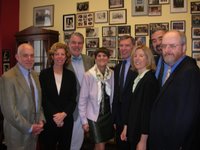Missed out on Playstation 3? Credit cards already maxxed? Holiday specials lost their charm? Don't fear December. Put down that
Sunday Styles section and pick up the December issue of
Connecticut Libraries. Every year at this time,
CL's editor, David Kapp, cajoles his colleagues in the CT Library Association to share their answers to his annual query, "If You Could Give Just One Book . . ." The result is a trifecta of gifts that are all easy to wrap, inexpensive, readily available, none of which will require you to stand in line at Wal-Mart. Even if you've long since given up on the whole gift-buying thing, the December
CL offers a choice of boon companions with which to enjoy a piping hot TV dinner and your own company. When the solstice is over and the Long Dark sets in for its annual three month stay, you (and/or your gift recipients) can settle in with any of these hot tips.
First, there's fiction. The editor himself recommends Ken Bruen's books, with "lots of profanity of the Irish variety, and violence and sex of the universal variety." After too many re-runs of
Christmas in Connecticut, escape with Kate Sheehan's tip,
The Ruins by Scott Smith, "an engrossing and frightening tale of a trip (to a Mexican beach) gone awry." Ramona Harten promises that with Diana Gabaldon's
Outlander series, (historical fiction/time travel/romance,) "the fireplace won't be the only thing keeping you warm." Cynde Lahey guarantees that
The Attack by Yasmina Khadra, set in the contemporary Middle East, will "keep you reading to the end." Finally, (not fiction, or is it?) Gail Thompson-Allen suggests Stephen King's
My Year of the Memoir.
If you are not afraid of too much reality, there is Xiaomei Gong's
Dealing with Difficult People by David Whitemyer, Bruce Johnson's
Mating in Captivity: Reconciling the Erotic and the Domestic by Esther Perel, and Vince Juliano's
The Know-it-All: One Man's Humble Quest to Become the Smartest Person in the World by A. J. Jacobs. Not that I'm hard to buy for, but some of these non-fiction tips were already on my list. Peter Ciparelli's
The World is Flat by Thomas Freidman, has been updated and expanded in 2006, (to enable the procrastinators among us?) My cousin Doug, as well as Henry Dutcher, was insistent that
Letter to a Christian Nation by Sam Harris is a must-read. The always-unpredictable Les Kozerowitz offers
The Book of Ecclesiastes, illustrated by Depression-era artist Ben Shahn. Even if you've given over completely to take-out, and have maxxed not only credit cards but also vacation time, you can still read Betty Anne Reiter's tip,
Biba's Italy by Biba Caggiano, which offers vicarious cooking and travel experiences. If you are lucky enough to still be receiving invitations to holiday parties, take Jacqueline's Toce's tip,
The Cake Mix Doctor by Ann Byrn, with which you can impress hostesses with your gifts of delicious, and only half-homemade baked goods.
There are picture books aplenty for kids in the December
CL, but, in addition, CLC's webmaster, Christine Sarrazin, has edited over 60 CT children's librarians' tips for CLC's annual booklist, "Best Books for Children & Teens: Lists for Holiday Gift Giving," available at
http://www.ctlibrarians.org/#homeBooklists. The hottest tip of all is to forget Wal-Mart completely, and go to Barnes and Noble on December 1-3. Before you go, first print out a Love Your Library voucher at
http://www.ctlibrarians.org/#homeLYL, so that 10-20% of your purchases will be donated to Connecticut's InfoAnytime, the 24/7 virtual reference service. Guilt-free giving, gifts for the giver, hot tips for a cold climate--Christmas in Connecticut is looking better already!




